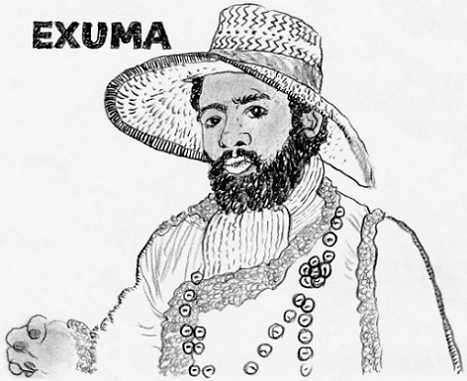
Voodoo Psychedelic Folk aus New York, yeah. The sun is shining in the night / Zombies walking in the broad day light / Zombie he done lost his soul / Zombie he don't ever get old. Exuma, The Obeah Man war der 1942 auf Cat Island, Bahamas geborene Musiker Macfarlane Gregory Anthony Mackey, der 1959 nach New York gezogen war und 1960 mit der Band Tony McKay & The Islanders in der Folkszene von Greenwich Village seine musikalische Reise begann. Entdeckt wurde er von Bob Wyld, dem Manager der Band Blues Magoos, der ihm einen Plattenvertrag bei Mercury Records verschaffte, wo 1970 das Debütalbum "Exuma" erschien. Unterstützt wurde Exuma (Vocals, Guitar, Bells, Drums) bei den Aufnahmen des Albums von Musiker*innen mit Pseudonymen wie Daddy Ya Ya (Vocals, Bells, Drums), Peppy The Spy Boy (Vocals, Triangle, Whistle, Bells), Lord Wellington (Congas) oder Princess Diana (Vocals). Peppy The Spy Boy ist jedenfalls Bob Wyld. Weiters werden noch die Sängerinnen Frances Yvonne 'Frankie' Gearing, Geraldine McBride, Mildred Vaney und Sally O'Brien als Mitwirkende genannt. In den liner notes des Albums steht zu lesen: He was black and played an acoustic guitar, but he wasn't singing the Blues and he sort of sounded like Richie Havens, but this wasn't what was considered Folk music. There were no electric instruments of any kind, the background vocals were chanted more than sung and what was sung sure couldn't be considered a collection of love songs. You just couldn't peg this album. It didn't really fit in anymore. Bei Mercury Records erschien 1970 noch das Album "Exuma II", danach wechselte Exuma zu Kama Sutra Records, wo bis 1973 noch die Alben "Do Wah Nanny", "Snake", "Reincarnation" und "Life" erschienen. Da sich die Alben eher schlecht als recht verkauften, verlor Exuma danach seinen Plattenvertrag und widmete sich vermehrt der Malerei. Doch Anfang der 80er Jahre kehrte er in die Popwelt zurück und es erschienen die beiden Alben "Penny Sausage" 1980 und "Universal" 1982. Der kommerzielle Erfolg war gering, aber die Fans freuten sich. Danach zog Exuma von New York nach New Orleans, wo er regelmäßig beim New Orleans Jazz And Heritage Festival und in der Old Absinthe Bar auftrat. Im Jahr 1986 erschien sein letztes Album "Rude Boy" bei ROIR Records. Ende der 80er Jahre erlitt Exuma einen leichten Herzinfarkt, war aber bald wieder auf den Beinen und weiterhin als Musiker aktiv. Alfred M. Sears schreibt über Exuma: A Bahamian visionary, humanistic philosopher and people's poet. Exuma gives expression to the beauty and power of the cultural life of the Bahamas - the people's every day experiences, folklore, myths, stories, junkanoo, rake and scrape, pain, joy, struggle and survival. His life and art reflect the wonderful cultural heritage and personality of Bahamians, drawing on the roots of Africa and the branches of the Amerindians, Europeans and Americans. Exuma starb 1997, angeblich friedlich und entspannt im Schlaf. Eigentlich ist fast alles von Exuma hörenswert, ein must-have sind aber die ersten beiden Alben "Exuma" und "Exuma II", die beide 2003 bei Mercury Records als CD wiederveröffentlicht wurden. Moving through the air as a flying thing, Exuma, The Obeah Man, will come and 'fix' your hand.